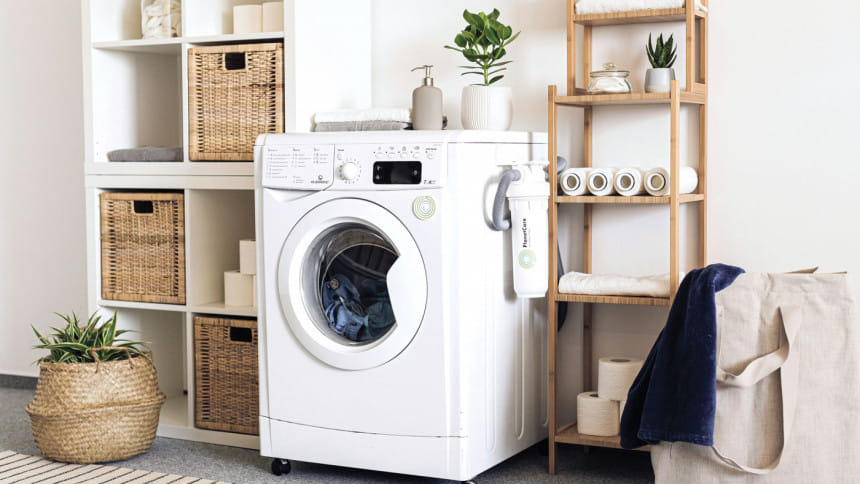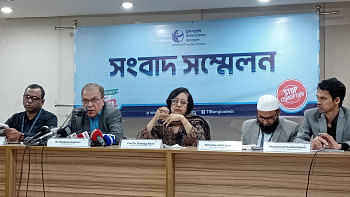Washing smart: The rising popularity of washing machines in Bangladesh

Washing machines are still considered luxury items in Bangladesh, but their popularity is steadily increasing as more consumers seek automated solutions for laundry. While not yet as common as televisions or refrigerators, they are becoming more affordable and essential with the country's social and economic progress. The market is growing by 5-10 percent annually, with significant potential for expansion in the coming years as more households adopt this time-saving appliance.
"Currently, only 3-4% of households in Bangladesh use washing machines, leaving ample room for market growth," says a representative of a leading industry stakeholder. At present, these appliances are mainly purchased by the highest-income segment. However, the rapidly expanding middle class, which is expected to make up one-third of the population soon, presents a key opportunity. "To tap into this potential, we need to raise awareness about the category and effectively communicate the benefits of washing machines to this emerging group," adds the industry insider.
Market insiders estimate that Bangladesh's washing machine market is valued at approximately 400-500 crore taka annually, with around 160,000-170,000 units sold each year.

Before 2010, the market was dominated by imported washing machines. However, over the past decade, the landscape has shifted dramatically as local companies have scaled up manufacturing and assembly. As a result, consumers are now enjoying more affordable prices.
Today, locally produced washing machines account for about 70-75% of the market, while imports make up just 25-30%—a complete reversal from the situation a decade ago.
"Complete production of washing machines in Bangladesh is not yet feasible. Many small parts and components are still required, which companies currently assemble after importing. Until 2010-2012, the market was almost entirely reliant on imports. Now, our company manufactures washing machines locally on a full scale," states Fazle Rabbi Khadem, Brand Manager of Walton Home & Kitchen Appliances.
Major domestic suppliers in the local washing machine market include Walton Group, Rangs eMart, Best Electronics, Jamuna Electronics, PRAN-RFL (Vision), Esquire Electronics, Electra International, and Super Star Group. Additionally, products from foreign brands such as Samsung, LG, Sharp, and Whirlpool are also popular. While Singer produces most of its washing machines locally at its factory, it imports certain premium models.
As demand for domestic appliances grows, the use of washing machines is also on the rise. However, they are still primarily viewed as urban products. Concerns remain about potential fabric damage, such as fading or weakening, along with worries about rising electricity costs associated with their use.

However, entry-level models are gaining popularity as their prices have become significantly more affordable. Smaller families with moderate incomes are increasingly opting for washing machines as a convenient, hassle-free laundry solution. This trend indicates a growing segment of customers seeking affordable entry-level options in the market.
"The semi-automatic segment starts at a price range of 10,000 to 12,000 taka, making it very affordable for consumers. Additionally, many companies are offering seasonal promotions and running marketing campaigns, presenting significant opportunities for market expansion," shares Fazle Rabbi Khadem from Walton.
There are primarily three types of washing machines: manual, semi-automatic, and fully automatic, with the latter available in top-loading and front-loading models. Top-loading machines, being more affordable, dominate demand, while front-loading machines, which are more expensive and feature advanced capabilities, are often seen as status symbols in home decor.
Currently, over 70% of washing machine sales are for top-loading models, but a shift is underway as demand for front-loading machines steadily grows.
Sales of washing machines typically increase during the rainy season and winter, as consumers seek solutions for drying wet clothes and avoiding the discomfort of handling cold water. This year, companies are again anticipating strong sales during the winter months.
"In the past two months, the market has been unstable due to political unrest and recent floods, but the overall market size is growing, and we are hopeful for increased sales moving forward," says Salim Ullah Salim, Director of Marketing at Jamuna Electronics and Automobiles Ltd.

The growth of the washing machine market has slowed after a period of robust expansion before the COVID-19 pandemic and the recent surge in inflation. This slowdown is attributed to both demand and supply constraints; however, market insiders are optimistic that these issues will be resolved in the future.
"The washing machine market in Bangladesh has not reached its full potential since the COVID-19 pandemic. During and immediately after the pandemic, washing machines became a necessity, changing the perception of them from luxury items. However, post-COVID economic turbulence has negatively impacted both demand and supply. Inflation has reduced the purchasing power of the emerging middle class, while challenges such as the foreign exchange crisis have made it difficult to open Letters of Credit, further constraining the market. Despite these challenges, we expect positive growth in the coming years," adds a market insider.
Despite difficulties in opening LCs for importing production materials, companies are strategically navigating the situation to expand market penetration and overcome the ongoing challenges.
"The country is currently facing a dollar crisis, and the cost of raw materials is soaring, which presents challenges in keeping prices affordable for buyers. However, we offer options such as EMI, seasonal promotions, and campaigns that are beneficial for consumers looking to purchase washing machines," says Fazle Rabbi Khadem.
Walton currently holds the largest market share for washing machine sales, with the highest figures recorded between July 2023 and June 2024. Since starting production in 2017, Walton has become a key player in the market.
In addition, Walton has begun exporting its washing machines to countries like Bhutan, East Timor, India, Iraq, Nepal, Uganda, and Yemen, where the products are gaining popularity and proudly representing Bangladesh on the global stage.
To unlock the full potential of the washing machine market, companies are continuously conducting research and making innovations to enhance product value by introducing new features for consumers.

 For all latest news, follow The Daily Star's Google News channel.
For all latest news, follow The Daily Star's Google News channel. 



Comments